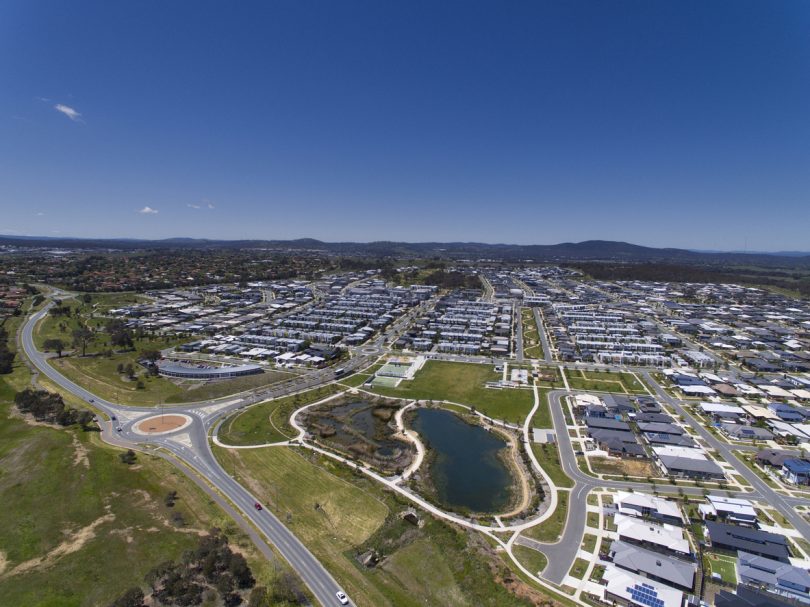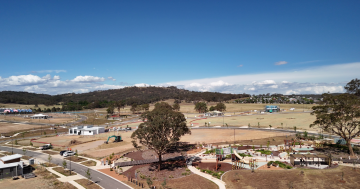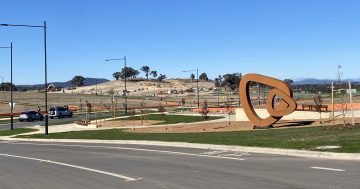
The Opposition is laying the blame for the housing crisis at the feet of the government, which they accuse of “strangling” land supply. Photo: File.
It has been accused of ‘strangling’ land supply and ruining Canberrans’ hopes and dreams of detached homeownership, but the ACT Government is firm in its belief that there is no such thing as a “simple solution” to the housing affordability crisis.
Opposition Leader Elizabeth Lee tried to move a motion in the Legislative Assembly today (22 March) calling on the government to use all its available policy levers – including land supply – to stem the affordability crisis.
Had it passed in its original form, it also would have obliged the government to commission a new housing choices survey.
However, Minister for Housing Yvette Berry defended the government’s approach to managing the affordability crisis – once again noting it’s a crisis occurring all around the country and much of the developed world.
“No one predicted this. We have to be realistic and recognise this is not just a question of supply,” Ms Berry said.
She also blasted the Opposition for presenting “simple solutions” to the housing problem and refuted the claim that it was drip-feeding land to the market.
“It’s not enough to put out a media release and say bulldoze this … there are no simple answers to delivering a well-planned city with communities for everyone,” Ms Berry argued.
Furthermore, Ms Berry said if the Canberra Liberals simply released more land, the shortage-plagued construction industry would be unable to deliver more dwellings.
She also referenced the government’s actions to address the affordability crisis, including gradually scaling back stamp duty, providing choice regarding housing type, and delivering affordable rentals.
Ultimately, Ms Berry watered-down Ms Lee’s motion to call on the government to, in turn, call on the Commonwealth to address housing affordability with the economic levers available to it, including by waiving the ACT’s historic housing debt.
It also asked the government to “continue” to deliver a variety of diverse, sustainable land and housing options to Canberrans.

Canberra Liberals Leader Elizabeth Lee said the government should pull the major policy lever it controls – land supply. Photo: Michelle Kroll.
In her address to the Assembly, Ms Lee referenced recent land ballots where demand had massively outstripped supply and said it was “unbelievable” that the ACT Government plans to “only” release 4171 single blocks in the next four years.
However, these are not the only homes the government will make available during that period. It will also release an extra 12,263 mid or high-density dwellings as part of its indicative land release program.
But Ms Lee argued this didn’t provide Canberrans with the choice they wanted.
She cited the government’s housing choices community survey of 2015 – the ‘Winton Report’ – which showed that almost 85 per cent of Canberrans would prefer to live in a detached house, with some support for dual occupancies and townhouses.
The report also found that under 2 per cent of Canberrans want to live in an apartment where the building is higher than three storeys.
Ms Lee said it seemed the government had chosen to ignore this “inconvenient truth”, and while there is a place in Canberra for multi-unit dwellings, it should not be the only option for Canberrans.
“Canberra, the bush capital, should be a city where people can choose to live in a house with a backyard if that’s what they prefer and not get forced into high-rise apartment towers,” Ms Lee said.
Last week, Ms Lee said the government’s announcement scrapping stamp duty on off-the-plan property purchases up to the value of $600,000 was just another way it was pushing “everyone into multi-dwelling and high-rise apartments”.
“We know that Canberrans are wanting choice.”
This is now the third time in the space of a month the ACT Government’s land supply program has drawn ire from its critics.
In a fiery debate in annual report hearings earlier this month, Opposition spokesperson for planning Peter Cain criticised Chief Minister Andrew Barr for the speed of land release, arguing it severely impacted and influenced the Territory’s “skyrocketing” house prices.
But Mr Barr said this was simply false and, because the release of new land constituted less than 2 per cent of the total market, it didn’t impact house prices in Canberra’s inner suburbs.
“The Chief Minister is not focused on economic fundamentals,” Mr Cain said.
“Everyone knows, if you severely restrict the availability of something, prices go up.”
Original Article published by Lottie Twyford on Riotact.






